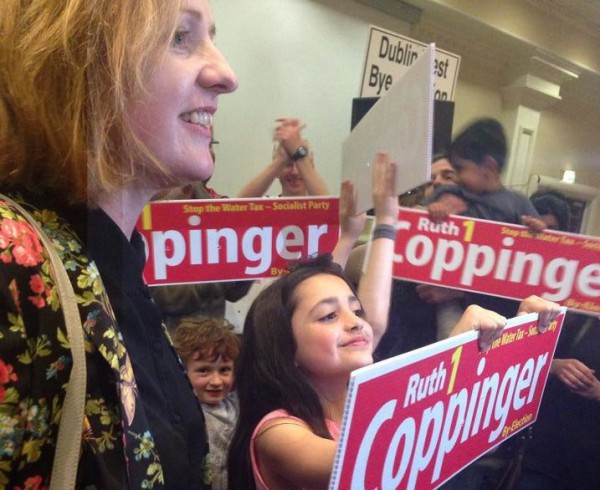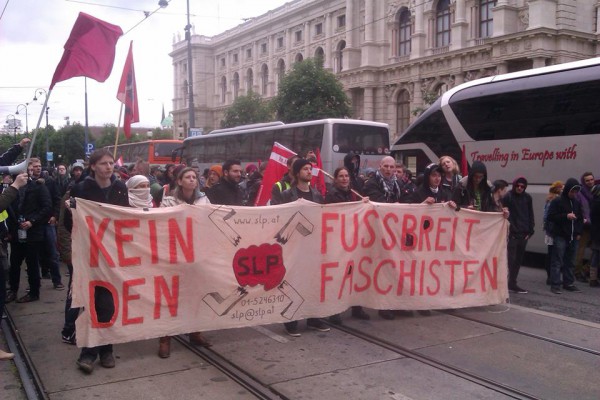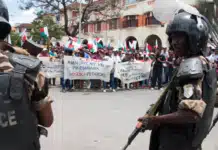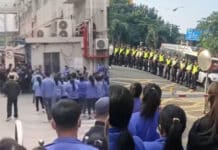Interview with CWI secretary, Tony Saunois
This article first appeared in sozialismus.info, the theoretical magazine of the CWI in Germany (Sozialistische Alternative).
This year is the 40th anniversary of the founding of the Committee for a Workers’ International. Who participated and what was discussed?
The CWI was founded on 20/21 April 1974 at a conference that took place in London. It was attended by 46 comrades. The British section organised in Militant was well represented along with comrades from organised groups in Ireland, Sweden and Germany. In addition, individuals were also present from Sri Lanka, Spain and some other countries. The comrades discussed ’World Perspectives’, ’Programme of the International’ and organisational questions. This meeting represented a very significant step in beginning to politically and organisationally build a new International which adheres to Trotskyist and Marxist methods and ideas.
What were the main reasons for the supporters of the Militant in Britain concluding that a new international organisation had to be built?
From the beginning the comrades at the time were internationalists and always supported the idea of building a revolutionary international. For a period the founders of the ’Militant’ in Britain were members of what came to be called the United Secretariat of the Fourth International (USFI), which at the time was the largest of the ’Trotskyist’ international organisations. But for important political reasons, the members of the ’Militant’ at the time concluded that it was necessary to begin the task of building a new International.
This followed their effective exclusion from the USFI in December 1965. The ‘Militant’, was launched in 1964 and, with Peter Taaffe as its editor, really began to develop. The USFI at that time reduced the ‘Militant’ group to the level of a sympathising section and recognised another group which had split from ‘Militant’.
Previously a series of political differences had developed between the comrades in ’Militant’ and the USFI. These centred on the question of the revolution in the neo-colonial world and also the role of the working class and the programme necessary for the workers’ movement. At that stage the leadership of the USFI were wrongly looking to other forces like the students to play the decisive role in the revolution as opposed to the working class.
The revolutionary processes under way at the time in the neo-colonial world, for example in Cuba and Vietnam, led the USFI to conclude that these developments were central to the world revolution. There was no prospect, they maintained, of a movement of the working class in the advanced capitalist countries for the foreseeable future. These erroneous ideas were a reflection of the consequences of the long, historic, post second world war upswing which capitalism experienced.
The comrades in ‘Militant’ rejected this approach. For them the importance of events in Cuba, Vietnam and other countries was fully recognised as was seen in the extensive material Peter Taaffe later produced analysing the Cuban revolution and its class character. But they also anticipated a new era of capitalist crisis and a resurgence in the class struggle in the industrialised capitalist countries – especially in Europe. The massive historic general strike involving 10 million workers in France in 1968 decisively refuted the ideas defended by the leadership of the USFI and vindicated the approach of ’Militant’.

The CWI was a very small force at the time of its foundation. How did this international organisation develop over the course of the next 40 years?
The CWI developed tremendously during the 1970s and the 1980s. In most, but not all countries, our comrades were active in what are now the former mass parties of the working class such as the Social Democrats in Sweden and Germany, the Socialist Parties in Belgium and the Labour Party in Britain.
It was a different historical era; these parties had a contradictory character. They had a pro-capitalist leadership on the one hand – a leadership which in the main accepted capitalism and wanted to reform it. On the other, they had a mass working class support and membership. They were ‘bourgeois workers’ parties’. Workers in that period saw these parties as ‘their’ political parties and a vehicle for struggle and change.
This decisively changed at the end of the 1980s and following the collapse of the former Stalinist regimes in the USSR and Eastern Europe in 1989/92. There was a massive ideological offensive by the capitalist class as these events unfolded. Together with the globalisation of capitalism and the neo-liberal offensive, it resulted in the leadership of these parties finally dropping the pretence of standing for socialism. They fully and openly embraced capitalism. These parties lost their base amongst the working class who no longer looked towards them to transform society but increasingly supported them in elections only as a “lesser evil”.
However, in the 1970s and 1980s, this was not the case. In Britain ’Militant’ supporters took a majority on the National Committee of the Labour Party Young Socialists in 1970. It was a relatively small organisation at the time. However, it was turned outwards and built into a campaigning, fighting young workers’ organisation. At its height, it had approximately 10,000 members.
In other countries like Belgium, Sweden, Ireland, CWI members fought for our policies and won support. In Britain the successes in the LPYS coincided with a surge to the left in the British Labour Party. ‘Militant’ won increased support in its ranks and also in the trade unions. At one stage we secured the election of three MPs.
In Ireland, ‘Militant’ supporters won a majority in Labour Youth and won an important influence in the Irish Labour Party. Through gaining the majority that ‘Militant’ secured in the LPYS, we were able to attend many international meetings of the socialist youth organisations which were affiliated to the International Union of Socialist Youth. Through these events we met other comrades who became collaborators and members of the CWI.
New sections of the CWI were established in this way, for example in Austria. In some countries, such as Sweden, the bureaucracy of the Social Democracy feared comrades so much that they were rapidly expelled from the youth section – the SSU. Through the LPYS in the 1970s, international campaigns such as the ’Spanish Young Socialists Defence Campaign’ were launched. This was to build solidarity with the workers’ movement and young people fighting to bring down the Franco dictatorship. Through this work, we not only managed to build solidarity for the struggle in Spain but met socialists who went on to form a section of the CWI in the underground.
Throughout this period the CWI expanded dramatically. A ’Marxist Workers’ Tendency’ was formed in South Africa which stressed the need to build independent trade unions in the struggle against apartheid and for Marxist polices to be adopted by the ANC. In Greece, a CWI section was established by the fusion together of different groups which fought for revolutionary ideas in the then newly formed Socialist Party – PASOK.
While the orientation towards the traditional mass parties of the working class predominated in the 1970s, the CWI also developed important forces working openly as revolutionary parties. This was the case in Sri Lanka and later also in Nigeria.
In the 1980s the revolutionary upheavals which rocked Latin America compelled the CWI to undertake interventions in these events. Comrades were sent to Argentina, Chile and later to Brazil to establish sections of the CWI in these countries. The Chilean Socialist Defence Campaign was launched to support these efforts in the underground and assisted in supported the formation of our Chilean section.
Our work was so successful in Britain that we won a decisive influence and leadership in Liverpool Labour Party. Through our leading influence on the city council, the comrades came into a head-on struggle with the Thatcher government. In this period most of our sections were rapidly increasing their membership and the section in Britain reached around 8,000 members at the height of the anti-Poll Tax struggle.
However, the world situation was changing and opened a far more complicated period for Marxists and the working class. The application and introduction of neo-liberalism, which began in the 1980s and was re-enforced by the collapse of the former Stalinist states, ushered in an entirely new era.
The worker’ movement internationally was thrown back politically. The former mass workers’ parties openly embraced and defended capitalism and the ’market’.
In Britain, supporters of ’Militant’ were expelled from the Labour Party thus preparing the way for the totally pro-capitalist Blairite Labour Party, inherited by Miliband. These changes forced a debate and discussion amongst the whole of the left including the ’Trotskyist’ left and the CWI.
Within the CWI the overwhelming majority of members recognised that a new world situation was opening up, posing new tasks for revolutionary Marxists. As the former Stalinist regimes collapsed, the CWI sent comrades to each of the countries concerned. Comrades went to Poland, Czechoslovakia, Hungary, Romania, East Germany and the former USSR. The CWI was amongst the first to recognise the process of capitalist restoration which was under way.
Following debate and discussion, we also saw that in more and more countries the period of work in what were becoming, or had become, fully capitalist parties needed to end. We concluded that revolutionaries now faced a dual task. This consisted of struggling to build revolutionary parties but also fighting for the formation of broad new mass workers’ parties which would represent a huge step forward for the working class in the light of the consequences of the collapse of the Stalinist regimes.
Despite the protracted nature of this process it still, we believe, retains its validity. One of the central tasks was, and remains, to rebuild support for the idea of socialism as an alternative to capitalism. Of course all the conclusions we have drawn today about this process could not have been immediately reached as the historic events of 1989/92 unfolded. However, the CWI majority were prepared to recognise the historic changes under way and were among the first to draw the necessary conclusions.
A minority of the CWI, however, kept their eyes firmly closed towards such developments. They were, and remain, imprisoned in the idea of working politically in what have become completely bourgeois parties. They initially refused to recognise the process of capitalist restoration which was under way in the former USSR and Eastern Europe or the consequences which flowed from it. A new world situation was being ushered in and the old formula no longer applied. However, they remained content to simply repeat it, irrespective of the changing world situation. This resulted in a split in the CWI in 1992 with the CWI majority parting company with a conservative minority.
Like all other forces on the left, numerically the CWI sections were pushed back in the 1990s. As events unfolded we took important initiatives to try and reach out to a new, younger generation. We launched the campaign ’Youth against Racism in Europe’ and succeeded in mobilising 40,000 Europe-wide to an anti-racist protest in Belgium.
Despite being pushed back numerically in the 1990s, we emerged, as an International, politically strengthened and tactically better prepared to meet the challenges of the 1990s and the first part of the 21st century. Had the CWI majority not made the political and tactical adjustments necessary to face up to the new period following the collapse of the former Stalinist states we would have been pushed even further back, as those who split from us have been.
Today we are building important, strengthened sections in many countries – 48 at the present time. Some are working in extremely difficult conditions and are swimming against the stream or facing the consequences of counter-revolutionary forces. For example our comrades in Pakistan, Sri Lanka and Israel. In other countries, however, we are poised for an important and potentially historic breakthrough.
In South Africa we have played an important role, together with the miners, in launching a new workers’ party – the Workers’ and Socialists’ Party (WASP). This has been re-enforced by the historic election victory of Socialist Alternative in Seattle USA. In Britain we have maintained and developed a strong base in the trade unions. In Ireland we have built an important influence reflected in the election successes that the comrades achieved in both the Irish Dail and the European Parliament. Now we need to prepare for other advances and important challenges in an era of intense global capitalist crisis and conflict.

What do you think have been the main assets the CWI has developed for the international workers’ movement in terms of ideas and methods?
I think the strength of the CWI politically can be found it its capacity to apply Marxism as a method and not as a rigid dogma. It is a weapon to enable workers to analyse events at each conjuncture and to draw the necessary conclusions of what is necessary to take the workers’ struggle forward. This has enabled the CWI to engage with workers and young people at each stage and to establish a dialogue with them, taking into account their political consciousness and awareness. It has allowed us to try and convince them of our ideas and programme. Doing this without falling into the trap of either opportunism or sectarianism is one of the greatest tests for a revolutionary organisation. While this or that mistake has of course been made, in general we have avoided it.
This method has enabled us to analyse the complexities of the modern world and crises which have developed, especially in the neo-colonial world in the recent period. It allowed our comrades in Venezuela to adopt a principled and balanced approach towards the Hugo Chavez government and the revolutionary process, unlike other groups. This method of analysis was vital in analysing the collapse of the Stalinist states, the consequences that this has had for the international working class and, crucially, in drawing the conclusions we have in relation to the tasks facing the working class and revolutionaries in this new situation.
In the complex situations which have arisen in countries like Egypt, Tunisia, Syria, Libya and now the Ukraine and Russia, this method has enabled us to adopt a principled position and avoid the mistakes of some other organisations which have either backed imperialist intervention or simply lent support to opposition forces which have assumed in some cases a reactionary character. Since the collapse of Stalinism, our struggle to form broad, democratic, new mass parties of the working class and combine this with the need to maintain and build revolutionary Marxist parties, is a crucial part of the political work and strength of the CWI.
What were the main successes of the CWI?
The CWI in many countries has scored some very important victories. The recent election of Kshama Sawant in Seattle and the role played by members of the DSM in South Africa in assisting the miners and others to launch the new workers’ party, WASP, are crucial steps forward in the recent period. They mark the opening of a new chapter of the class struggle and the work of the CWI. To this must be added the tremendous work of our comrades in Ireland over many years – the battles they fought over the water charges and bin charges campaign, the election victories scored by Joe Higgins from the Socialist Party and others. All are crucial landmarks in the work of the CWI and examples can be given from many countries.
However, thus far, the most significant has been the massive impact we had in the British Labour Party in the 1970s and particularly in the 1980s which allowed our comrades to really have an effect on the situation and in the workers’ movement. Mass work and the leadership of mass movements was undertaken in that period. ‘Militant’ was a household name. The election of three MPs – Dave Nellist, Terry Fields and Pat Wall – reflected this.
Through this influence we mobilised millions in the anti-poll tax campaign which ultimately caused the downfall of the hated Margaret Thatcher. In this period in Liverpool, ’Militant’ supporters led the council into battle against the Thatcher government and forced it to give concessions. A city-wide general strike and mass demonstration of 50,000, as part of the campaign, demonstrated how ’Marxists’ can use the platform of local councils and MPs to help mobilise workers and fight for their rights.
This work over decades meant that ’Militant’ succeeded in conducting the most effective work done in Europe by ’Trotskyists’ in the workers’ movement and amongst the working class. Thus far these are amongst the greatest successes of the CWI. Some of our smaller sections have also been able to have a significant impact. The election of councillors in Australia and the struggles led by comrades there, the courageous work of our Pakistani and Israeli comrades are an illustration of this.
It is also necessary to stress that following the collapse of the former Stalinist states, Marxists internationally have faced an extremely difficult two and half decades. In some respects, due to the ideological assault by the ruling class against the idea of socialism and the capitulation by the official workers’ leaders to capitalism, these have been amongst the most difficult of decades.
On the Marxist left, many abandoned support for revolutionary ideas and the struggle to build a revolutionary party. Even the CWI was partly affected by this when former members in Scotland abandoned the idea of building a Marxist revolutionary party. However, the overwhelming majority of the CWI has fought through this difficult period and taken the steps forward that were possible.
It is a great achievement that the CWI has been capable of analysing the political developments during this period and the tasks for the working class and revolutionaries. That we have emerged with the forces we have is also a colossal achievement. The new era of capitalist crisis that is now developing will give new opportunities for all of the supporters and sections of the CWI to build more powerful forces and lead even bigger successes than we were able to achieve in the 1980s in Britain.
What is the relationship of the CWI with other organisations and tendencies who consider themselves Marxist and revolutionary? Does the CWI have the view of developing into a mass force ‘on its own’ and what role could cooperation or even mergers with other forces play?
The CWI is prepared to meet the new challenges of the situation which are now opening up internationally as a consequence of the systemic crisis in which world capitalism now finds itself. It means a catastrophe for the working class and the poor internationally. Already the horrors of capitalism in crisis have plunged some countries into barbarism and slaughter. Mass unemployment with few prospects face an entire generation in Europe and on all continents. The effects of climate change are having a devastating effect on all the peoples of the planet.
There is an urgent need to build a powerful mass workers’ international. The CWI is striving to achieve this objective. At this stage the CWI is not such a force. While confident and proud of our achievements and what we will be able to achieve in the next period we are also realistic. The CWI is not a mass international. The name, Committee for a Workers’ International, was adopted for this reason. We believe that the forces around the CWI have a crucial and decisive role to play in building s new mass international.
At the same time we recognise that other forces exist which adhere to ‘Marxism’ and ‘Trotskyism’. Where such forces are serious and are prepared to have an honest political discussion and debate, we are ready and open to enter discussion and dialogue with them. Joint campaigns and international solidarity, along with other activity, are possible and are indeed organised by the CWI and its sections together with other forces.
If political agreement on a principled honest basis can be reached, then it would be irresponsible of any revolutionary organisation not to strive to come together on a unified basis and take advantage of this strengthened position. However, it is in our view a mistake to attempt such a unification where there is not sufficient political agreement. This will only result in further disagreement and division and disappointment.
Following the collapse of the former Stalinist states, a period of debate and discussion opened up in all of the ‘Trotskyist’ groupings and Internationals. In the past we fused together with Trotskyist and Marxist forces in Sri Lanka and later in Nigeria. More recently our comrades in Brazil have successfully fused together with forces from other traditions and are successfully intervening in the party, the PSOL (’Socialism and Freedom Party’).
In the 1990s the CWI sought to open a dialogue with other international organisations to see if there was the prospect of reaching agreement in a new world situation. We visited and engaged in some discussion with international organisations like the USFI, the International Workers League (LIT), the International Workers’ Unity (UIT) and others. However, there was not sufficient agreement.
Nevertheless, the CWI remains open to debate and discussion with comrades from these and other traditions to see if there is agreement and we are open to collaborate in joint campaigns and activity where possible.
The building of a new mass international will not develop only through one grouping. New parties and forces will emerge in the future as a result of the class struggle which do not yet exist. They, together with some already existing forces, will play a crucial role. We believe that the analysis, methods and ideas of the CWI and its forces will and must play a central part in this process.
The building of a new mass international is now an urgent task. There are however no short cuts. The rebuilding of the workers’ organisations and support for the alternative of a socialist society will develop amongst a new generation of workers as a result of their experience in the class struggle. The CWI and others can assist this process in the coming period.
The experience of our relatively small forces in South Africa, who have played a decisive role in helping to form WASP, illustrates that under the right objective conditions, where the working class is seeking a socialist alternative, illustrates the prospects that will open up for most of the sections of the CWI in the coming period. The CWI has achieved a tremendous amount in the last forty years – nearly half of which consisted of considerably difficult objective conditions. However, our future achievements and successes, we are confident, will surpass all that we have managed to do so far.





